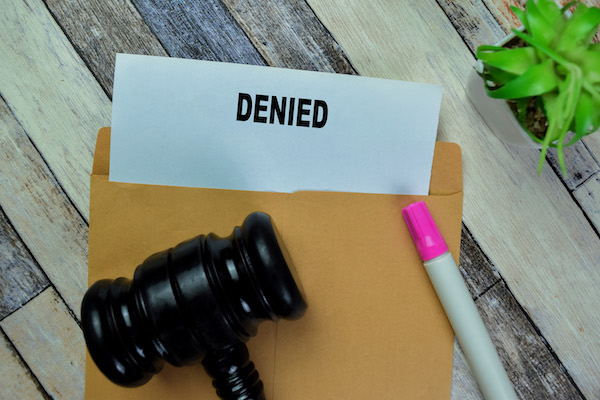“Congress has committed the decision to institute inter partes review to the Director’s unreviewable discretion.” – USPTO response brief in Intel v. Vidal
 The U.S. Supreme Court today denied certiorari in Intel v. Vidal, a case that asked the Court to overturn a U.S. Court of Appeals for the Federal Circuit (CAFC) ruling concerning the Patent Trial and Appeal Board’s (PTAB’s) so-called Fintiv framework. The CAFC’s March 2023 decision said appellate review of whether the PTAB’s discretionary denial rules for inter partes review (IPR) are “arbitrary and capricious” was precluded by Section 314(d) of the patent statute.
The U.S. Supreme Court today denied certiorari in Intel v. Vidal, a case that asked the Court to overturn a U.S. Court of Appeals for the Federal Circuit (CAFC) ruling concerning the Patent Trial and Appeal Board’s (PTAB’s) so-called Fintiv framework. The CAFC’s March 2023 decision said appellate review of whether the PTAB’s discretionary denial rules for inter partes review (IPR) are “arbitrary and capricious” was precluded by Section 314(d) of the patent statute.
The Supreme Court petition was filed by Intel in August 2023 after the Federal Circuit said the U.S. District Court for the Northern District of California was correct in holding that the petitioners’ claims should be dismissed because they challenged U.S. Patent and Trademark Office (USPTO) Director actions that were not reviewable. The district court specifically said that “35 U.S.C. § 314(d), together with Cuozzo and Thryv, precluded review because, to rule on the challenges, the court ‘would have to analyze questions that are closely tied to the application and interpretation of statutes’ governing institution decisions.”
The district court plaintiffs, which also included Apple, Inc., asserted three grounds under the Administrative Procedure Act (APA): (1) that the Director acted contrary to the IPR provisions of the patent statute; (2) that the Fintiv instructions are arbitrary and capricious; and (3) that the Fintiv instructions were issued without compliance with the notice-and-comment rulemaking requirements.
The CAFC ultimately said that Apple had standing to pursue its claim that the Director’s instructions to the PTAB regarding discretionary denial practice under Apple Inc. v. Fintiv, Inc. were made without proper notice-and-comment rulemaking but otherwise affirmed the court’s ruling.
In the Supreme Court petition, which was filed by Intel with Edwards Life Sciences, the companies argued that the discretionary denial rules have “curtailed access to [inter partes review] IPR by setting restrictive, non-statutory standards the Board must apply in deciding whether to institute an IPR.”
But in its response brief filed in November 2023 by the USPTO to the petition, the Office said that, although the America Invents Act (AIA) identifies “certain circumstances in which inter partes review may not lawfully be instituted,” it does not specify any circumstances “in which institution is required. Thus, even when a petition meets the statutory conditions for inter partes review, there is ‘no mandate’ for the USPTO ‘to institute review,’” explained the brief. As the High Court itself stated in United States v. Arthrex, Inc., 141 S. Ct. 1970, 1977 (2021), the brief added, “Congress has committed the decision to institute inter partes review to the Director’s unreviewable discretion.”

![[IPWatchdog Logo]](https://ipwatchdog.com/wp-content/themes/IPWatchdog%20-%202023/assets/images/temp/logo-small@2x.png)

![[Advertisement]](https://ipwatchdog.com/wp-content/uploads/2024/04/UnitedLex-May-2-2024-sidebar-700x500-1.jpg)
![[Advertisement]](https://ipwatchdog.com/wp-content/uploads/2024/04/Artificial-Intelligence-2024-REPLAY-sidebar-700x500-corrected.jpg)
![[Advertisement]](https://ipwatchdog.com/wp-content/uploads/2024/04/Patent-Litigation-Masters-2024-sidebar-700x500-1.jpg)

![[Advertisement]](https://ipwatchdog.com/wp-content/uploads/2021/12/WEBINAR-336-x-280-px.png)
![[Advertisement]](https://ipwatchdog.com/wp-content/uploads/2021/12/2021-Patent-Practice-on-Demand-recorded-Feb-2021-336-x-280.jpg)
![[Advertisement]](https://ipwatchdog.com/wp-content/uploads/2021/12/Ad-4-The-Invent-Patent-System™.png)






Join the Discussion
One comment so far.
Pro Say
January 8, 2024 06:46 pmBravo SCOTUS (credit where credit is due).
More like these please.